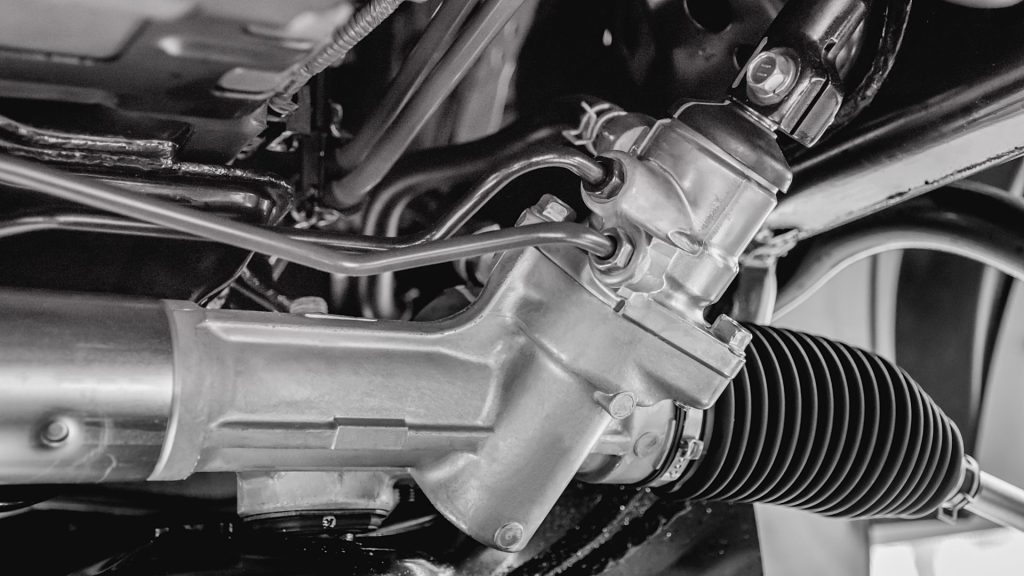Why is my steering wheel hard to turn? — causes and fixes
Address the reasons behind a difficult-to-turn steering wheel.

Your steering wheel is an essential component of the control mechanism of your vehicle. You will be unable to make a turn, maneuver into the parking spot, change lanes or avoid a pothole without a steering wheel. A steering wheel failure can harm you and other vehicles on the road because it can lead to severe accidents.
You could be trying to make a turn or change lanes, and then your steering wheel becomes hard to turn or even lock up. This can result in a fatal accident. Your steering wheel must stay in excellent condition to give you maximum control over your vehicle.
The stiffness of your steering wheel is easily noticeable when turning at low speeds. It indicates an issue in the power steering system that needs to be inspected and fixed by a mechanic. In this article, we will delve into why a steering wheel is hard to turn.
Common reasons why the steering wheel is hard to turn

The steering wheel can be hard to turn at low speeds and suddenly loosen up once you speed up. It is crucial to inspect the steering wheel when it is hard to shift because the issue can result in severe accidents. It is almost certain that there is a glitch in your power steering system if your steering wheel becomes hard to turn.
It could be a serpentine belt, fluid, or pump issue. These components reduce the resistance of the wheel when turning. If any of these components fail to function adequately, you will notice that your steering wheel will be hard to turn due to the high resistance level.
The wear and tear of certain parts, coupled with the skipping of routine servicing and irregular maintenance, are the most prevalent reasons for a stiff steering wheel. It is crucial to keep up with regular maintenance and know the reasons why the steering wheel is stiff and learn how to diagnose it. Below are some reasons why your steering is getting harder to turn.
Power steering fluid leakage
The power steering system requires an adequate power steering fluid to function appropriately. This fluid is a passage where power is transferred from the steering wheel to the vehicle’s steering mechanism to turn the wheels. The fluid also lubricates and protects the moving components in the power steering system from corrosion and overheating.
A power steering fluid leakage is the most common cause of a steering wheel hard-to-turn problem. Fluid leakage can result from a loose or crack in the pressurized hose area. If the power steering fluid leaks from the crack, it reduces the pressure in the system, making the steering pump too hard to cover the loss of pressure.
When this occurs, the steering wheel will not get an adequate fluid supply freely, and you will have to put out greater force than usual. Refilling the fluid in the power steering tank can fix the problem for a short period. However, the leak should get taken care of to avoid power steering failure and expensive repairs.
Thickening power steering fluid
A thickened power steering fluid can result in a stiff steering wheel. It is an unavoidable issue that becomes prevalent over an extended period. The power steering fluid does not have an infinite lifespan as it collects debris and dirt over time.
It is essential to regularly change the fluid according to the manufacturer’s recommended intervals. If you fail to change the fluid within a specific period, it will thicken and lose its ability to lubricate the power steering system adequately.
A thickened power steering fluid may let you turn the wheel, but more force must be exerted. It is best to flush the old fluid from the system and refill it with a new power steering fluid.
Bad steering rack
The steering rack is an essential component of the pinion unit and rack. It is responsible for attaching the steering wheel to the mechanisms that turn the wheels in the desired navigated direction.
The steering rack is attached to the steering wheel through several U-joints and shafts. These components and the steering rack wear out after extended driving. When you notice that your steering wheel is hard to turn after starting your car, but the wheel gradually turns well as you continue driving, the problem arises from a faulty steering rack.
This problem occurs because the steering rack warms up as the engine runs, letting the lubricant settle in. You can continue driving with this condition but not for an extended period, as it will escalate the issue.
Malfunctioning power steering pump
The power steering pump transfers the steering fluid to the rack and pinion unit. When you turn the steering wheel, the control valve in the steering system lets the fluid flow into the pinion, letting you turn the wheel without much physical exertion.
The power steering pump plays a significant role in maintaining an adequate amount of pressure in the power steering system. It enables you to turn the steering wheel smoothly without much exertion of force. If the power steering pump becomes faulty, it will be hard to turn the steering wheel.
A faulty pump may not lock up the steering wheel entirely but may cause more force must be exerted. This can be dangerous when you need to take a sharp turn. The power steering pump is designed to last for thousands of miles. However, it may sometimes fail prematurely.
Before it becomes faulty, the steering pump will make a grinding or whining noise, especially when taking a sharp turn. Since a belt drives the steering pump belt, the engine’s RPM increases and the sound gets louder. A loose or damaged connector to the pump can make the pump fail.
Before getting your power steering pump replaced, you should inspect it to see if it is the cause of a stiff steering wheel. A pump replacement costs between $500 to $600 if you get a professional service, and if you do it yourself, it costs between $100 to $200.
Damaged serpentine belt
A broken or cracked serpentine belt can cause the steering wheel to get hard to turn. The serpentine plays an essential role within the engine and aids the operation of the power steering pump. It gets cracked or worn out over time because it operates all the time while you are driving.
If it becomes cracked or loose, the steering wheels will display signs of hardness. If you fail to repair or replace the belt, it may cause the belt to break, making the steering wheel break down.
A broken serpentine belt can cause other parts on it to stop working. Some components that rely on the serpentine belt include; the alternator, the air conditioning compressor, and the water pump. A broken belt can cause a pulley failure which will cause the vehicle to overheat.
Tire pressure
Insufficient air pressure can cause a steering wheel to get stiff when turning. An inadequate tire pressure or deflated tires can cause this issue. Your vehicle tires must be inflated according to the recommended PSI from the manufacturers.
Uneven wear on the front tires of your vehicle can cause your car to pull to a corner while taking a sharp turn or driving. This is the reason why front-end alignment is a necessary procedure. An uneven tire tread leads to misalignment of wheels which can be a reason for a stiff steering wheel when taking turns on the road.
Our take
When your steering wheel becomes difficult to turn, it is crucial to get it checked immediately to avoid the failure of other components and expensive repairs. Carrying out a diagnosis on the steering wheel is pretty simple, but you can also visit an auto repair shop for the inspection and repair.
How do you fix a hard power steering?
There are several ways how to fix a hard power steering wheel. Some of the steps include:u003cbru003eInspect and refill the power steering fluid.u003cbru003eCheck the gauge of the tire air pressure.u003cbru003eInspect the power steering rack and pump.u003cbru003eCheck the front-end suspension components.u003cbru003eEnsure that your drive belt works adequately.
How much does it cost to fix a hard steering wheel?
The power steering fluid system repair costs between $500 to $650. The specific price depends on what exactly is faulty with the power steering system. u003cbru003eu003cbru003eFor instance, if you need the fluid hose replacement, you can spend between $60 to $150 on the components and an extra charge for the labor. The prices of the parts depend on your vehicle’s make and model.
What can cause the steering to be hard?
When your steering wheel becomes hard, several factors can cause the problem. A thickened power steering fluid that results from accumulated dirt and debris over time can cause this. Inadequate tire pressure, especially a deflated tire, can cause the steering wheel to get hard.u003cbru003e
What does it mean when the steering wheel is hard to turn?
When the steering wheel gets challenging to turn, it may result from a low power steering fluid in the system, insufficient air pressure in the tires, a damaged steering rack, a broken serpentine belt, and a damaged power steering pump. It is crucial to get your vehicle inspected to avoid further damage.